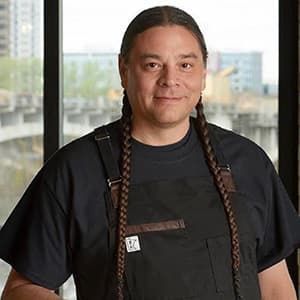
Chef Sean Sherman is on a mission.
“We have to understand and address the history of Indigenous People and how all of the really brutal and violent history has removed us from a lot of our food ways and the knowledge of our food ways,” the Oglala Lakota chef said. “It’s going to be imperative for us to redefine, reconnect and re-identify what our Indigenous food means to us moving forward into the future.”
Chef Sean was born on the Pine Ridge Reservation in South Dakota, and he’s spent his 30-year culinary career working to revitalize Indigenous food systems, while also educating non-Indigenous folks about what modern day Indigenous food actually is.
That passion was born from an epiphany Chef Sean had while working in the restaurant industry in Minneapolis after college. He’d been around quite a bit. He’d learned a lot – but he realized something was missing.
“There was a complete absence of anything Indigenous in the culinary world,” he said. “Why aren’t there Native American restaurants everywhere? Why aren’t there books on the topic? Why aren’t there Native American celebrity chefs?”
The answer, according to Chef Sean, is American colonialism.
“What did we lose as Indigenous people besides land access? What kind of education was taken from us? Let’s look at the immense diversity and try to embrace it instead of trying to homogenize it.”
To that end, Chef Sean started a nonprofit called North American Traditional Indigenous Food Systems (NATIFS), which is working to create access to Indigenous foods and access to education about those foods.
“Creating food access is something that’s always needed. There needs to be support systems for Indigenous entrepreneurs and producers,” he said.
NATIFS has created a Native market space that will be opening soon, where people can purchase Native food products from Native producers. But the larger goal is to ensure Native communities realize the full potential of their Native foods.
“We want to help them develop and define what their own Indigenous food operations could be and giving them support and the tools and resources they need to be successful,” he said.
In addition to supporting Native growers and producers, Chef Sean is hoping to raise awareness of modern-day Indigenous food. And at the epicenter of that effort is his restaurant in downtown Minneapolis – Owamni.
Named after a waterfall called Owamni Yomni by the Dakota, which used to sit near the restaurant, Owamni recently won the James Beard Award for Best New Restaurant. It features a menu that prioritizes Native ingredients grown by Native producers.
What you won’t find are any colonial ingredients.
“I really focus on region and culture. So, I remove things like dairy, wheat flour, cane sugar, beef, pork and chicken,” Chef Sean said. “(I’m) experimenting to create dishes that tell a story about Indigenous people, producers and flavors.”
Ultimately, that story is one Chef Sean hopes to share with as many people as possible.
“Food is such a powerful language for anyone,” he said. “We’re just showcasing what’s possible and creating situations to teach other people so that hopefully they can define themselves as individuals or communities as a whole.”
Chef Sean recently kicked off Feeding America’s recognition of National Native American Heritage Month with a cooking demonstration and presentation on Native American food sovereignty. Learn more about Feeding America’s work with Native American communities.
